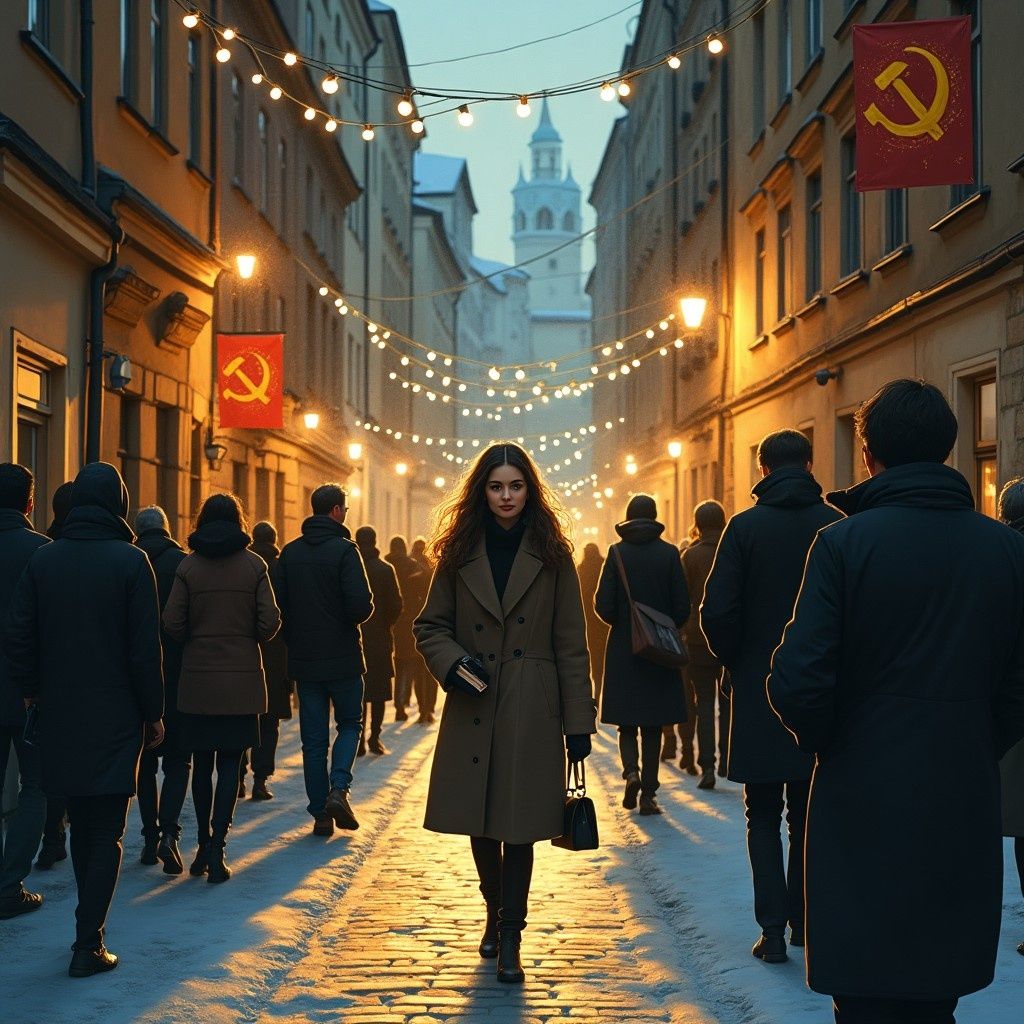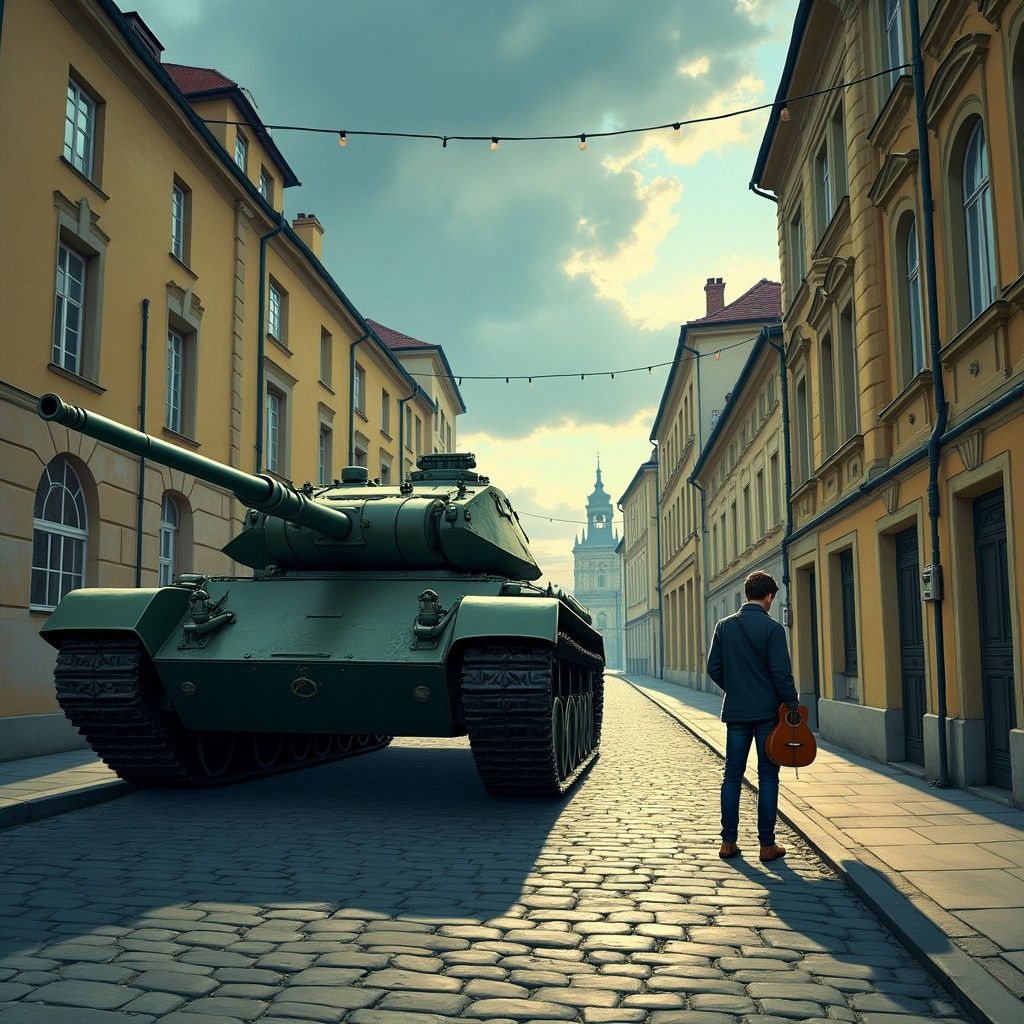Title: "Echoes of Spring"
The cobblestones of Prague's narrow streets seemed to hum with a newfound energy, a rhythm of hope that had not been felt in years. Jana, a young journalist with ink-stained fingers and an insatiable curiosity, felt it in every step she took. The city was alive, whispering promises of change and freedom. It was January 1968, and the air was thick with the scent of revolution.

Jana's world had always been confined by the rigid lines of censorship and control. Her articles, once stripped of any hint of dissent, were now flourishing under the light of Alexander Dubček's reforms. "Socialism with a human face," they called it, and for the first time, she could write with honesty, with passion. Her words danced across the pages, speaking truths that had long been silenced. In the heart of the city, in a small café that had become a haven for artists and thinkers, Jana met Tomas. He was a musician, his guitar a constant companion, his songs a tapestry of dreams and defiance. His music spoke of freedom, of a world where voices were not stifled by fear. Jana found herself drawn to him, to the fire in his eyes and the courage in his heart. As spring unfurled its blossoms, so too did the spirit of Prague. The streets were alive with debate and laughter, the walls adorned with posters proclaiming liberty. Jana and Tomas were swept up in the tide, their lives intertwined with the fate of their city. They spoke of the future, of a world where their children could grow up unshackled by oppression.

But beneath the surface, shadows loomed. The Soviet Union watched with growing unease, its patience wearing thin. The whispers of change had reached too far, too fast, and the threat of retribution hung heavy in the air. August arrived with a chill that belied the summer sun. Tanks rolled into Prague, their iron tracks carving scars into the city's soul. The invasion was swift and brutal, a stark reminder of the limits of freedom under Soviet rule. The streets that had once echoed with laughter now trembled with fear.

Jana watched from her window as soldiers marched through the city, their presence a grim testament to the fragility of hope. Her typewriter sat silent, its keys cold and unyielding. The words that had once flowed so freely were now trapped within her, stifled by the weight of despair. Tomas's music, once a beacon of resistance, was silenced. His guitar lay abandoned, a relic of a dream that had been crushed beneath the boots of an invading army. But even in the darkest moments, the spirit of Prague refused to be extinguished. In secret gatherings, whispers of defiance persisted. Jana and Tomas, though beaten, were not broken. They clung to the belief that one day, the echoes of their spring would resound once more. As the years passed, the city settled into a grim "normalization," the vibrant colors of the Prague Spring faded to gray. But the seeds of change had been sown, and beneath the surface, they waited, biding their time. Jana continued to write, her words a quiet rebellion against the silence imposed upon her. Tomas found solace in his music, each note a reminder of what had been and what could be again. Together, they nurtured the memory of a time when hope had bloomed in the heart of Prague. And though the world outside remained unchanged, within them burned a fire that could not be extinguished—a testament to the enduring power of dreams and the unyielding spirit of a city that had dared to imagine a different future.

Jana's world had always been confined by the rigid lines of censorship and control. Her articles, once stripped of any hint of dissent, were now flourishing under the light of Alexander Dubček's reforms. "Socialism with a human face," they called it, and for the first time, she could write with honesty, with passion. Her words danced across the pages, speaking truths that had long been silenced. In the heart of the city, in a small café that had become a haven for artists and thinkers, Jana met Tomas. He was a musician, his guitar a constant companion, his songs a tapestry of dreams and defiance. His music spoke of freedom, of a world where voices were not stifled by fear. Jana found herself drawn to him, to the fire in his eyes and the courage in his heart. As spring unfurled its blossoms, so too did the spirit of Prague. The streets were alive with debate and laughter, the walls adorned with posters proclaiming liberty. Jana and Tomas were swept up in the tide, their lives intertwined with the fate of their city. They spoke of the future, of a world where their children could grow up unshackled by oppression.

But beneath the surface, shadows loomed. The Soviet Union watched with growing unease, its patience wearing thin. The whispers of change had reached too far, too fast, and the threat of retribution hung heavy in the air. August arrived with a chill that belied the summer sun. Tanks rolled into Prague, their iron tracks carving scars into the city's soul. The invasion was swift and brutal, a stark reminder of the limits of freedom under Soviet rule. The streets that had once echoed with laughter now trembled with fear.

Jana watched from her window as soldiers marched through the city, their presence a grim testament to the fragility of hope. Her typewriter sat silent, its keys cold and unyielding. The words that had once flowed so freely were now trapped within her, stifled by the weight of despair. Tomas's music, once a beacon of resistance, was silenced. His guitar lay abandoned, a relic of a dream that had been crushed beneath the boots of an invading army. But even in the darkest moments, the spirit of Prague refused to be extinguished. In secret gatherings, whispers of defiance persisted. Jana and Tomas, though beaten, were not broken. They clung to the belief that one day, the echoes of their spring would resound once more. As the years passed, the city settled into a grim "normalization," the vibrant colors of the Prague Spring faded to gray. But the seeds of change had been sown, and beneath the surface, they waited, biding their time. Jana continued to write, her words a quiet rebellion against the silence imposed upon her. Tomas found solace in his music, each note a reminder of what had been and what could be again. Together, they nurtured the memory of a time when hope had bloomed in the heart of Prague. And though the world outside remained unchanged, within them burned a fire that could not be extinguished—a testament to the enduring power of dreams and the unyielding spirit of a city that had dared to imagine a different future.
The Prague Spring was a brief period of political liberalization in Czechoslovakia that began in January 1968 when Alexander Dubček became the First Secretary of the Communist Party. Dubček's reforms aimed to create "socialism with a human face" by loosening restrictions on media, speech, and travel, and decentralizing the economy. However, these changes alarmed the Soviet Union, leading to a Warsaw Pact invasion in August 1968 to suppress the reforms. The invasion marked a significant moment in Cold War history, highlighting the limits of Soviet tolerance for deviation within its sphere and leading to a period of "normalization" under Gustáv Husák, who reversed Dubček's reforms. The Prague Spring left a lasting cultural impact, inspiring literature and music, and influencing future movements for political change in Eastern Europe.


Comments
Post a Comment